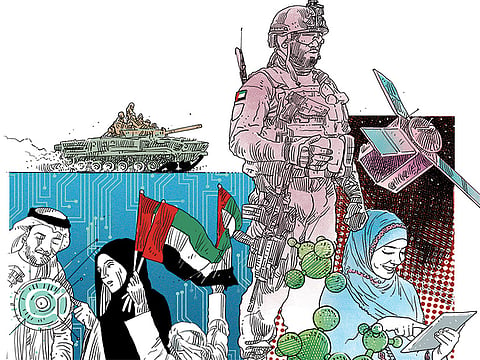Mabrouk to the UAE
The UAE celebrates 45 years as a committed member of the global community, with a proud Arab heritage

Although only 45 years old, the UAE is a confident and modern country that is playing a significant part in the international community of nations. Commitment to a cooperative approach and a belief in the power of negotiated solutions and the international rule of law is a vital part of the legacy of the founding President Shaikh Zayed Bin Sultan Al Nahyan. The UAE is a committed member of the United Nations, it hosts the International Renewable Energy Authority (Irena) in Abu Dhabi, it is an important contributor to the International Monetary Fund (IMF) and World Bank, and has played its part in G20 discussions — like when coordinated action was needed in 2010 to avert a major global recession.
At a regional level the UAE has become an important leader in the struggle to reimpose law and order across the region. Many long-established Arab states like Egypt, Iraq and Syria collapsed in the revolutions that followed the upheavals of 2011, which left a dangerous vacuum which was ruthlessly exploited by extremists and terrorists. The UAE recognised the necessity of articulating the traditional Muslim values of tolerance and the rule of law, encouraging people to think for themselves and seek to realise their ambitions.
In a startling shift from the country’s previous reticence to speak out, a steady series of significant speeches from UAE leaders made the intellectual case against Daesh (the self-proclaimed Islamic State of Iraq and the Levant). And it was important that the UAE did not just oppose Daesh, but also stood up for the positive values that the country holds dear. Its emphasis on the positives, as well as its readiness to oppose the negatives, made the UAE’s message all the more powerful.
In addition, the UAE has been willing to put its soldiers in danger, and has suffered tragic loss of life in the cause of fighting for these values that the country stands for. As part of the fight against terror and Daesh, the UAE has committed its troops to the international coalitions in Iraq and Syria, and has also played a significant part in the regional coalition fighting Al Houthi insurgents in Yemen. UAE forces played a dominant role in the early stages of the war, and mounted a successful assault on Aden using navy, air force and ground troops to drive Al Houthi forces out of the city and the surrounding region.
UAE forces are now heavily committed to the successful liberation of large parts of southern Yemen from Al Qaida that used the chaos of the war to try to establish some territorial control, and the UAE government is also making substantial efforts to help the reconstruction of those areas of Yemen.
Helping troubled regions
It is building hospitals, rebuilding roads and other infrastructure, with the intention that the people of Yemen are able to rebuild their lives and return to normality.
This is an important part of the UAE’s engagement internationally where it has traditionally seen its role as helping the people of troubled regions: with large refugee camps in Kosovo, and after the floods in Pakistan, and today in Jordan where millions of Syrians have been forced to flee the terrible violence in their country.
This exceptional willingness to reach out across the world is one example of the UAE’s political confidence in the loyalty of its people and the leadership’s knowledge that they and the people together have built this country. And it is important to remember that this extraordinary outcome was not a sure thing when the nation was formed.
In the late 1960s, the British abruptly told the rulers of the separate emirates on the Trucial Coast that they would leave the Gulf within a very few years.
It is a magnificent tribute to the rulers of that time that despite the chaos of the British departure they were able to merge their emirates into one nation-state, develop a clear demarcation of federal and emirate authority that has both stood the test of time, and over 45 years allowed the country to develop into the successful modern state that the UAE has become.
The key to this success has been the priority that the government has laid on education and social responsibility.
This has built a population that is both proud of its achievements and willing to take them further.
The country would fail without the engaged participation of its people, so the government’s encouragement of active citizenship is an important part of bringing the population into being involved in the development of their country.
While of lot attention has been paid to the UAE’s role in regional security and international affairs, the key to its confidence on the global stage is that it is sure of the interest of its population in their nation.
This is why the national pride generated on Flag Day, followed by the dignified honouring of those who died in their country’s service on Commemoration Day, and the widespread exhilaration of National Day, all combine to sum up the commitment that UAE citizens have to their country. Their hard work over 45 years has truly built a nation.


